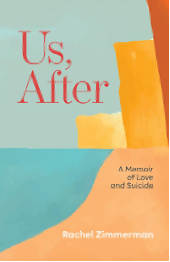 Review by Diane Gottlieb
Review by Diane Gottlieb
No one would accuse Rachel Zimmerman of burying the lede. Here’s how she starts “Widow,” chapter one of her riveting memoir Us After: A Memoir of Love and Suicide:
If I were writing a news story, I’d start like this:
On July 1, 2014, Seth Teller, MIT professor and father of two, parked his crimson
Honda Insight on the Tobin Bridge, three miles from his home in Cambridge, Massachusetts, and jumped to his death (5).
A former journalist, Zimmerman knows the importance of providing the facts—up front. As a memoirist, she knows her readers will walk with her along the more slippery surfaces, revisit with her the days and years since her husband’s death, as she builds a life without him and creates a stable home for her daughters. It is Zimmerman’s ability to tell it straight, combined with her thoughtful, honest, and heartfelt reflections, that make hers a compelling voice in this remarkably compelling memoir.
Seth, Zimmerman’s husband, had just turned fifty before he died. A trailblazer in the field of robotics and a tenured professor at MIT, he was deeply engaged in work he knew would help others and change the world. Seth was equally involved with his family; he loved being a hands-on dad and was the anchor Zimmerman and her daughters never imagined living without: “There had been no visible illness, no danger signs” (10).
Zimmerman knew the who, what, when, and where, but she was desperate to learn the “why” of her husband’s suicide. “What did I miss?” became an obsession. As she searched for answers, Zimmerman realized how much pain Seth had kept to himself. He had planned a family reunion that took place a few days before his death. Even as he “threw a disc with his cousins’ children, manned the grill,” Zimmerman noticed his mood was off: “Slightly snappy, then withdrawn … At several points he expressed new worries to me about pressure at work, a surprise since he almost always kept his troubles quiet” (65). There was pressure at work. Seth had spent the last year and a half programming a robot named Atlas for an upcoming competition. When the rules of the contest changed, Seth became deeply troubled, as he no longer felt his chances of winning were secure. Zimmerman writes, “I had no way then to comprehend how much Seth feared failure” (67).
Seth also experienced relentless tinnitus, which dramatically interfered with his sleep—and his waking hours. He knew he needed help and met with a psychiatrist the day before his suicide. While he expressed suicidal ideation, he convinced the psychiatrist he would not act on those thoughts. No one believed Seth would take his own life. Tragically, he did. But why? The question burned, as did another: could she have done anything to stop him?
Leaning on her journalist’s drive and skills, Zimmerman was able to gain access to scholars in the field of suicide research, such as Matthey Nock from Harvard. But Nock had few answers to offer. “‘Clinicians,’ he said, ‘are no better than a coin toss at identifying who is at risk for suicide.’ Despite all the experiments and studies he and his colleagues were leading, Nock said, suicide remains, for the most part, a scientific black box” (90).
In another particularly poignant scene, Zimmerman meets with Leonard, a man who had jumped off the same bridge as Seth but survived. At the time, Leonard believed his decision to jump was a rational one. He had no last thoughts at the bridge, no last feelings. Zimmerman realized, “Seth wasn’t thinking of us when he jumped. He wasn’t thinking at all” (165).
While much of Us, After focuses on Zimmerman’s search for answers regarding Seth’s death, the rest is also deeply moving. Zimmerman recounts the effects on the family’s day-to-day life. Her inner mama bear immediately takes over, as she does everything in her power to keep her daughters physically and emotionally safe. Each of her daughters deals with the loss differently, and Zimmerman provides each the space to heal as she needs. We learn of Zimmerman’s heightened anxiety, of her initial reluctance to accept her own mother’s help. We see people, whom Zimmerman didn’t expect, rise to support her; we see several whom she’d thought she could count on, disappoint. Throughout the aftermath, we bear witness to Zimmerman’s strength, even as she shares her greatest challenges.
Us, After is an incredibly moving memoir of pain and seeking, but more so, it is a story of resilience. While Zimmerman will never truly be able to fully grasp the “why”s of her husband’s death, she courageously discovers the “how”s of moving forward after a sudden, devastating loss, of making a new life, of always continuing to grow.
Us After: A Memoir of Love and Suicide by Rachel Zimmerman
Santa Fe Writer’s Project, 2024, $15.95 [paper]
ISBN: 9781951631352
Diane Gottlieb is the editor of Awakenings: Stories of Body & Consciousness (ELJ Editions) and the Prose/CNF editor of Emerge Literary Journal. Her writing appears in Witness, Colorado Review, River Teeth, Florida Review, SmokeLong Quarterly, among many others.
